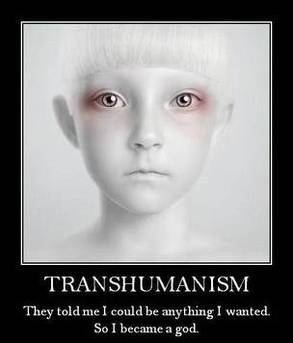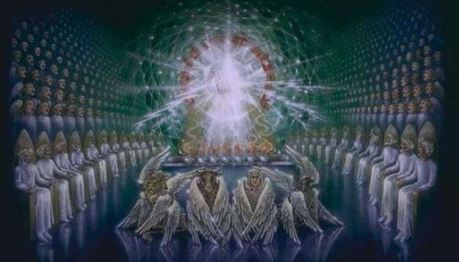TRANSHUMANISM

The idea of becoming like God—living forever, acquiring unbounded knowledge, and living a life of unsurpassed wellbeing—has been around since the beginning of man:
But the serpent said to the woman, You shall not surely die, For God knows that in the day you eat of it your eyes will be opened, and you will be like God, knowing the difference between good and evil and blessing and calamity. And when the woman saw that the tree was good (suitable, pleasant) for food and that it was delightful to look at, and a tree to be desired in order to make one wise, she took of its fruit and ate; and she gave some also to her husband, and he ate. Genesis 3:4-6 (AMP)
From the beginning, man has been tempted with the promise of and desire for immortality, enlightenment, and godhood. As stated above, the claim to Eve was that she would not die and that she would not only be like God, but she would have the knowledge of God. She could have all this apart from God, through doing that which was forbidden by God. This promise and pursuit continues today in what is known as transhumanism.
The purpose for this topic is to introduce you to the concepts goals and possible consequences of transhumanism; a transhumanism 101 if you will. We will present information from both the transhumanist perspective and from a biblical / Christian perspective. As time goes on, we will dig a little deeper into the thoughts and plans of this movement. We will look at the potential correlations found in scripture that may disclose the part this movement will play in the end times.
We have tried to present this information in a logical and systematic way that will make comprehension easier. We have also avoided as much sensationalism as possible in order to engage the most skeptic viewer. When it is all said and done, we hope we have added to your knowledge and understanding and perhaps stretched your thinking a bit. Enjoy!
But the serpent said to the woman, You shall not surely die, For God knows that in the day you eat of it your eyes will be opened, and you will be like God, knowing the difference between good and evil and blessing and calamity. And when the woman saw that the tree was good (suitable, pleasant) for food and that it was delightful to look at, and a tree to be desired in order to make one wise, she took of its fruit and ate; and she gave some also to her husband, and he ate. Genesis 3:4-6 (AMP)
From the beginning, man has been tempted with the promise of and desire for immortality, enlightenment, and godhood. As stated above, the claim to Eve was that she would not die and that she would not only be like God, but she would have the knowledge of God. She could have all this apart from God, through doing that which was forbidden by God. This promise and pursuit continues today in what is known as transhumanism.
The purpose for this topic is to introduce you to the concepts goals and possible consequences of transhumanism; a transhumanism 101 if you will. We will present information from both the transhumanist perspective and from a biblical / Christian perspective. As time goes on, we will dig a little deeper into the thoughts and plans of this movement. We will look at the potential correlations found in scripture that may disclose the part this movement will play in the end times.
We have tried to present this information in a logical and systematic way that will make comprehension easier. We have also avoided as much sensationalism as possible in order to engage the most skeptic viewer. When it is all said and done, we hope we have added to your knowledge and understanding and perhaps stretched your thinking a bit. Enjoy!
THE SON'S OF GOD AND
THE NEPHILIM

Genesis 6 contains one of the most controversial passages in scripture which has incited both debate and outright vitriol. It is a story that is seen by many as being shrouded in mystery, or entertaining the fantastic. It is a series of unusual events that transpired during antediluvian (pre-flood) civilizations, as well as afterwards, that seems stranger than fiction. Nevertheless, the importance of understanding these few verses of scripture could have significant impact on our world view and eschatology.
The information presented here provides a discussion of the controversy in a rational and non-sensationalized way for those seeking to understand the true meaning of these scriptures. While we do not endorse all the opinions reflected by the authors and speakers represented here, we do believe that their general position concerning Genesis 6, the Sons of God, the Nephilim, and the very reason for the great flood is the most reliable and scholarly interpretation.
The information presented here provides a discussion of the controversy in a rational and non-sensationalized way for those seeking to understand the true meaning of these scriptures. While we do not endorse all the opinions reflected by the authors and speakers represented here, we do believe that their general position concerning Genesis 6, the Sons of God, the Nephilim, and the very reason for the great flood is the most reliable and scholarly interpretation.
THE DIVINE COUNCIL

God has taken his place in the divine council; in the midst of the gods he holds judgement
Psalm 82:1
The study of the divine council is more academic in nature, in that it requires an understanding of certain words and phrases in ancient languages, as well as cultural world views. Since I am not an expert in ancient biblical languages or biblical cosmology, I will refer to those much more qualified to speak on this subject. People such as Michael Heiser, D. Neiman, H. W. Robinson, P. D. Miller and others will be referred to. One of the more prolific writers and scholars on the divine council is Michael Heiser. According to Heiser, “the term divine council is used by Hebrew and Semitics scholars to refer to the heavenly host, the pantheon of divine beings who administer the affairs of the cosmos under Yahweh, the God of Israel. All ancient Mediterranean cultures had some conception of a divine council, including Israel. However, Israelite religion’s divine council was distinct. The structure of the Israelite divine council has implications for understanding God and the unseen world in biblical theology." Let me state right from the start that a proper understanding of the divine council in no way challenges or dismisses monotheism. In fact, the very opposite is true.
